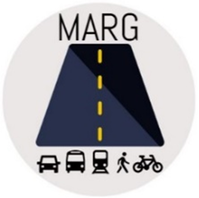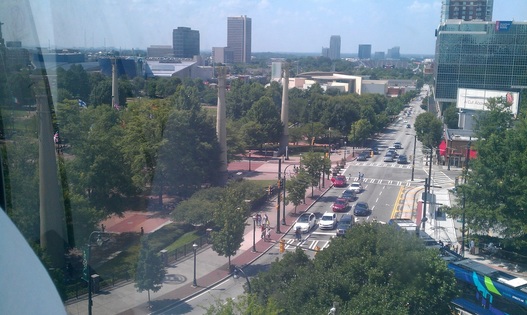What We DoThe Mobility Analytics Research Group (MARG) is dedicated to the development of advanced transport modeling methods, algorithms, and computational tools that can be implemented in practice. The team has extensive experience in multimodal travel demand modeling, integrated modeling of activity-travel patterns and network dynamics, and evaluation of the impacts of emerging technologies, policies, and demand management strategies. The group specializes in the statistical and econometric analysis of activity-travel and time use data sets with a view to better understand and explain traveler behavior and values under a wide variety of policy, modal, and geographic contexts. The name of the group is derived from the Sanskrit word "Marg", which literally means path, way, or route.
|
Sponsors and Collaborators |
The work of the Mobility Analytics Research Group has benefited greatly from the support of a number of sponsors. Funding for various projects that led to or involved the development of MARG's methods and tools was provided by:
The Mobility Analytics Research Group (MARG) has collaborated with faculty members at a number of academic institutions to help advance transport modeling methods. Collaborative activities have been undertaken with: |
History |
The activities of the Mobility Analytics Research Group (MARG) can be traced to the early work pursued by Professor Ram M. Pendyala under the guidance of his advisor and mentor, the late Professor Ryuichi Kitamura. With funding provided under Track B of the original Travel Model Improvement Program of the US Department of Transportation (Federal Highway Administration), Pendyala worked on a project led by Kitamura to develop an activity-based microsimulation model system capable of simulating impacts of travel demand management strategies and transportation control measures on activity-travel behavior. The activity-based model system was called AMOS.
In subsequent efforts, AMOS was further refined and a prototype application was developed with funding from the Florida Department of Transportation. The resulting model system, called FAMOS (Florida Activity Mobility Simulator) demonstrated the computational feasibility and behavioral modeling capabilities of the continuous-time activity-based travel modeling approach. Kitamura and his team of research scholars at Kyoto University, Japan developed PCATS, the prism-constrained activity-travel simulator as a new and improved activity-based travel demand model system. MARG then integrated concepts of AMOS and PCATS to develop a new open source activity-based travel model system called openAMOS (open source activity mobility simulator). In 2007-2008, Kitamura proposed an integrated travel modeling framework in which a continuous time activity-based travel model (PCATS) would be tightly integrated with a dynamic event-based network simulator (DEBNetS) such that activity-travel patterns evolved in response to network dynamics (while recognizing time-space prism constraints). This integrated model system (PCATS-DEBNetS) was developed and tested in Japan by Kitamura and his group of research scholars. Kitamura would pass away in February 2009 without having fully realized his vision of implementing a truly integrated modeling paradigm capable of reflecting behavioral dynamics under time-varying real-time policy scenarios and network conditions. The Mobility Analytics Research Group (MARG) obtained an Exploratory Advanced Research Program (EARP) project in 2008 to develop an integrated model of the urban continuum. This five year project, sponsored by the Federal Highway Administration, contributed to the development of a new synthetic population generator (PopGen) and a more mature integrated model system of the urban continuum comprising land use, activity-travel demand, and network dynamics. The integrated model system was dubbed SimTRAVEL (simulator of transport, routes, activities, vehicles, emissions, and land). Key members of MARG (at the time that this site was established in 2016), including Dr. Karthik C. Konduri, Dr. Venu M. Garikapati, and Dr. Daehyun You, were PhD students of Pendyala at Arizona State University during the period of 2007-2014 and worked intensively on the development of increasingly advanced versions of SimTRAVEL. A number of other individuals, scholars, and students provided incredible support to the Mobility Analytics Research Group; they are listed in the Team page. Over the course of a number of years, members of MARG have collaborated with consulting firms and academic partners on a number of basic and applied research projects sponsored by federal, state, and local agencies. These efforts have contributed to the development of a number of tools, methods, and algorithms. MARG is committed to advancing the state-of-the-art and state-of-the-practice of transport modeling by developing new analytical approaches and computational methods and moving them into practice. |


